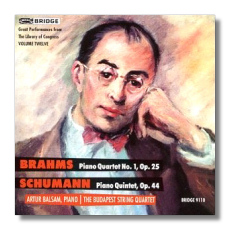
The Internet's Premier Classical Music Source
Related Links
- Latest Reviews
- More Reviews
-
By Composer
-
Collections
DVD & Blu-ray
Books
Concert Reviews
Articles/Interviews
Software
Audio
Search Amazon
Recommended Links
Site News
 CD Review
CD Review
Library of Congress Concerts

Budapest String Quartet
- Johannes Brahms: Piano Quartet #1, Op. 25
- Robert Schumann: Piano Quintet, Op. 44
Artur Balsam, piano
Budapest String Quartet
Bridge 9110 ADD monaural 67:35
This is Volume 12 in Bridge's outstanding series of live recordings from The Library of Congress. If one's space or budget is limited, commercial recordings of both of these works might ultimately be preferred for one's collection. These performances, however, are technically strong and interpretively galvanizing, and the sound quality is not markedly inferior to what was available on vinyl at that time. Therefore, once one has heard Balsam with the Budapest String Quartet, their performances quickly become an almost necessary complement to just about any other commercial recording that one can name. Furthermore, the Balsam/Budapest collaborations were not preserved on commercial discs at that time, so Bridge's release has undeniable historical value.
The Brahms was performed on 12/18/51, and the Schumann comes from 12/18/53. (Second violinist Jac Gorodetzky sits out the Brahms.) Balsam, who perhaps is most famous for accompanying violinist Nathan Milstein, steps up to the plate in these fiery and romantic works as a fully equipped equal partner for the Quartet. Even without the "safety net" of the recording studio to catch him, he takes chances – for example, in the chains of staccato chords in the Schumann's Scherzo – and the chances consistently pay off. Balsam provides brilliance without ego and drive without pressure. In the gentler sections, his simplicity and honesty rival that of Clifford Curzon, the Budapest String Quartet's partner on earlier occasions.
Many connoisseurs feel that the Quartet's line-up at the time – violinists Gorodetzky and Joseph Roisman, violist Boris Kroyt, and cellist Mischa Schneider – never was surpassed. One hears them working hard to communicate with the audience and with each other in both the Brahms and the Schumann – no routine here, just seriousness and integrity, and an intense respect for the music. No member dominates the other, except when the music requires it. At the same time, the Quartet is not too high-minded to ignore the almost animalistic passages of excitement found in both of these works, particularly in the "alla zingarese" finale of the Brahms. Here, Balsam willingly joins in the fray, too. Paprika and pepper are the dominant spices in these performances, yet there is honey where it is needed, and also beef.
Copyright © 2002, Raymond Tuttle




















